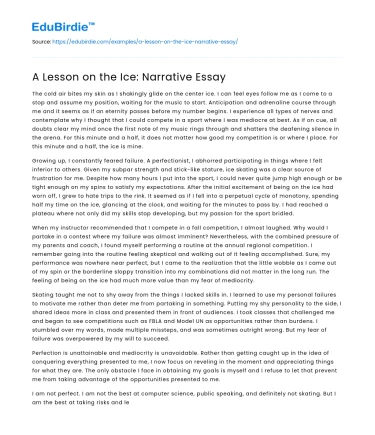The cold air bites my skin as I shakingly glide on the center ice. I can feel eyes follow me as I come to a stop and assume my position, waiting for the music to start. Anticipation and adrenaline course through me and it seems as if an eternity passes before my number begins. I experience all types of nerves and contemplate why I thought that I could compete in a sport where I was mediocre at best. As if on cue, all doubts clear my mind once the first note of my music rings through and shatters the deafening silence in the arena. For this minute and a half, it does not matter how good my competition is or where I place. For this minute and a half, the ice is mine.
Growing up, I constantly feared failure. A perfectionist, I abhorred participating in things where I felt inferior to others. Given my subpar strength and stick-like stature, ice skating was a clear source of frustration for me. Despite how many hours I put into the sport, I could never quite jump high enough or be tight enough on my spins to satisfy my expectations. After the initial excitement of being on the ice had worn off, I grew to hate trips to the rink. It seemed as if I fell into a perpetual cycle of monotony, spending half my time on the ice, glancing at the clock, and waiting for the minutes to pass by. I had reached a plateau where not only did my skills stop developing, but my passion for the sport bridled.
Save your time!
We can take care of your essay
- Proper editing and formatting
- Free revision, title page, and bibliography
- Flexible prices and money-back guarantee
When my instructor recommended that I compete in a fall competition, I almost laughed. Why would I partake in a contest where my failure was almost imminent? Nevertheless, with the combined pressure of my parents and coach, I found myself performing a routine at the annual regional competition. I remember going into the routine feeling skeptical and walking out of it feeling accomplished. Sure, my performance was nowhere near perfect, but I came to the realization that the little wobble as I came out of my spin or the borderline sloppy transition into my combinations did not matter in the long run. The feeling of being on the ice had much more value than my fear of mediocrity.
Skating taught me not to shy away from the things I lacked skills in. I learned to use my personal failures to motivate me rather than deter me from partaking in something. Putting my shy personality to the side, I shared ideas more in class and presented them in front of audiences. I took classes that challenged me and began to see competitions such as FBLA and Model UN as opportunities rather than burdens. I stumbled over my words, made multiple missteps, and was sometimes outright wrong. But my fear of failure was overpowered by my will to succeed.
Perfection is unattainable and mediocrity is unavoidable. Rather than getting caught up in the idea of conquering everything presented to me, I now focus on reveling in the moment and appreciating things for what they are. The only obstacle I face in obtaining my goals is myself and I refuse to let that prevent me from taking advantage of the opportunities presented to me.
I am not perfect. I am not the best at computer science, public speaking, and definitely not skating. But I am the best at taking risks and learning from my miscues. I am the best at not letting fear hold me back. I am the best version of myself that I can be.






 Stuck on your essay?
Stuck on your essay?

